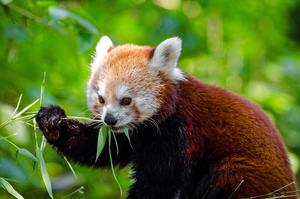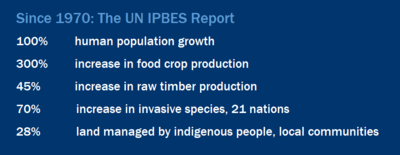1 Million Species at Risk: National Geographic
Humans, their growing numbers and development, are overwhelming the world’s other 8.5 million species. “Without a global societal transformation that focuses on protecting nature, one million species may be pushed to extinction by human activities in the coming years – with serious consequences for human beings and the rest of life on Earth – according to a landmark United Nations report on the health of nature,” writes Stephen Leahy for National Geographic. More than 140 authors reviewed 15,000 sources for the report from the Intergovernmental Science-Policy Platform on Biodiversity and Ecosystem Services. Deforestation and other forms of land conversion, overfishing, hunting and poaching of endangered species, climate change, pollution and invasive species drive the decline. Intense human activity will ruin economies, food and physical security, health and quality of life. Nature is the foundation for development, the report notes. Individuals and nations must emphasize sustainability over economic growth. Nations should end subsidies for energy, fishing, agriculture and forestry sectors and instead devote funds to protection. Evidence suggests that indigenous and local management surpasses corporate management. A barren world offers no future for a human population projected to grow from 7.5 billion to 10 billion during this century. – YaleGlobal
1 Million Species at Risk: National Geographic
UN report warns that humans are destroying economies and livelihoods by failing to safeguard biodiversity and a healthy planet – and gives recommendations
Monday, May 6, 2019


Read the article from National Geographic about a UN report warning about the loss of 1 million species.
Read more about the IPBES report.
Read about the independent Intergovernmental Science-Policy Platform on Biodiversity and Ecosystem Services: “ The objective of IPBES is to strengthen the science-policy interface for biodiversity and ecosystem services for the conservation and sustainable use of biodiversity, long-term human well-being and sustainable development.”
National Geographic
NG Content is protected by copyright, trademark, patent, trade secret and other laws